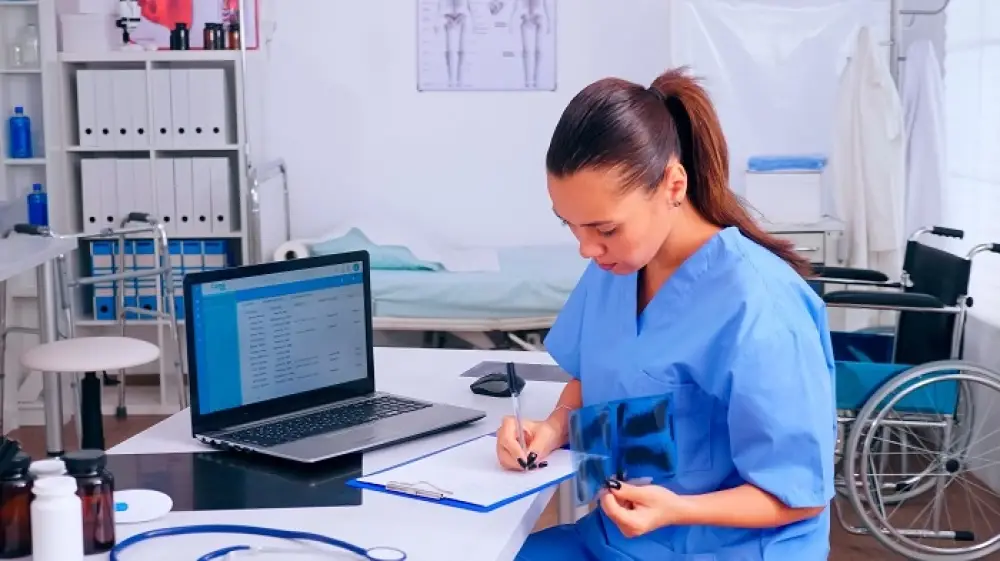Skills for a Nurse: Why Continuous Professional Development (CPD) Matters
Nursing is one of the most rewarding yet demanding professions, requiring a blend of technical expertise, emotional resilience, and continuous learning. Every day, nurses safeguard patient health, deliver compassionate care, and provide critical support to families during their most challenging times. While formal medical training establishes a strong foundation, the realities of modern healthcare mean that the skills for a nurse must constantly evolve to keep pace with new treatments, technologies, and patient expectations. This balance of clinical ability, interpersonal skills, and professional judgment is what sets outstanding nurses apart.
The essential skills for a nurse go far beyond medical knowledge. They include effective communication, empathy, leadership, and adaptability—qualities that directly impact patient outcomes and teamwork in fast-paced environments. In the UK, nurses often work across hospitals, care homes, and community settings, where these skills can determine the success of care delivery. For example, strong communication ensures safe and accurate handovers, while empathy fosters trust and emotional support for patients from diverse backgrounds. Leadership and adaptability are equally important, helping nurses manage emergencies, handle complex cases, and mentor junior colleagues. To refine and maintain these abilities, Nursing CPD provides structured opportunities for ongoing professional development, ensuring nurses remain effective, confident, and prepared for the ever-changing healthcare landscape.
This is where Continuing Professional Development (CPD) becomes indispensable. CPD allows nurses to refine and expand these skills throughout their careers, ensuring they remain confident and competent in a rapidly changing healthcare system. Whether it’s staying updated with the latest clinical guidelines, enhancing cultural competency, or developing resilience strategies, CPD supports nurses in delivering high-quality care while also meeting the requirements of the Nursing and Midwifery Council (NMC). For many UK nurses, CPD is not just about compliance—it’s about professional pride and continuous growth.
By investing in CPD, nurses can strengthen both their technical expertise and their ability to connect with patients on a human level. Ready to take the next step in your career? Explore our [Nursing CPD Courses] to develop the skills that truly make a difference.
Find out how CPD Programs can boost your future.
What Are the Core Skills for a Nurse?
Nursing is a profession that blends science, compassion, and resilience. To succeed in this demanding yet highly rewarding field, nurses need to master a wide range of core skills that go far beyond the basics of medical knowledge. These skills ensure not only the safe delivery of care but also the emotional well-being of patients and their families.
Clinical skills form the foundation of nursing practice. From administering medication safely to monitoring vital signs and implementing strict infection control measures, nurses are on the front line of patient safety. Their technical expertise ensures that treatment is delivered effectively and in line with the latest healthcare standards.
Equally important are critical thinking and decision-making abilities. Nurses are often faced with complex situations where quick judgments can make a life-saving difference. The ability to assess, prioritise, and act under pressure is vital in fast-paced environments such as hospitals and emergency care.
Build your skills with CPD Accreditation programs.
Strong communication skills are another cornerstone. Nurses must clearly explain treatment plans to patients, provide emotional support to families, and collaborate seamlessly with doctors, therapists, and other healthcare professionals.
At the heart of nursing lies compassion and empathy. Building trust and offering reassurance is just as important as medical interventions. These human qualities help patients feel valued and supported throughout their care journey.
Finally, adaptability and resilience are essential. Nurses face constant challenges—from emergencies and stressful situations to evolving healthcare systems. The ability to cope, recover, and continue delivering excellent care is what sustains long-term success in this profession.
For nurses looking to strengthen and expand these essential skills, structured training is key. Explore our Healthcare CPD Courses to stay updated, build confidence, and grow in your nursing career.
Why Nurses Need to Continuously Develop Their Skills
Nursing is one of the most dynamic and demanding professions. The essential skills for a nurse are not fixed; they must evolve alongside advancements in healthcare, patient needs, and regulatory standards. Continuous Professional Development (CPD) plays a vital role in ensuring that nurses remain confident, competent, and capable throughout their careers.
Keeping Up with Rapid Healthcare Changes
The healthcare sector is constantly changing, with new technologies, treatments, and care protocols emerging each year. From digital health tools to AI-driven diagnostics, modern practice requires nurses to adapt quickly. By regularly updating the skills for a nurse, professionals can provide safe, effective, and evidence-based care.
Meeting Regulatory Requirements
In the UK, the Nursing and Midwifery Council (NMC) mandates revalidation every three years, which includes completing at least 35 hours of CPD. This ensures that nurses continue to learn, reflect, and apply updated knowledge in their daily roles. Ongoing development safeguards both professional standards and patient wellbeing.
Enhancing Patient Safety
Patient care is at the heart of nursing. Strengthening the skills for a nurse directly improves safety, reduces errors, and builds trust with patients and their families. From infection control to advanced communication techniques, continuous learning helps nurses uphold the highest standards of care.
Supporting Career Progression
Beyond compliance and safety, professional growth is another key motivator. Developing specialist nursing skills—whether in mental health, palliative care, or leadership—opens doors to advanced roles and higher responsibilities. Nurses who invest in CPD not only future-proof their careers but also increase job satisfaction.
By investing in continuous development, nurses ensure that their skills remain sharp, relevant, and impactful.
Explore our complete range of CPD resources.
How CPD Supports the Development of Nursing Skills
In the UK’s fast-paced healthcare environment, continuous learning is essential for nurses to remain effective and adaptable. Nursing CPD (Continuing Professional Development) provides structured opportunities for skill-building, reflection, and personal growth. By engaging in CPD, nurses not only meet regulatory requirements but also enhance the quality of care they deliver every day.
Start your journey with CPD Courses.
Structured CPD – Building Skills with Accredited Training
Structured Nursing CPD involves formal learning such as accredited online courses, professional workshops, and recognised certifications. These programs are designed to equip nurses with updated clinical knowledge, advanced patient care techniques, and management expertise. For example, a CPD course in wound care management ensures that nurses can apply the latest evidence-based practices in patient treatment.
Reflective CPD – Learning from Real-Life Experience
Equally important is reflective Nursing CPD, which allows professionals to learn from practice. Activities such as case studies, peer discussions, and maintaining reflective journals encourage nurses to analyse their experiences and identify areas for improvement. This form of CPD helps develop critical thinking, empathy, and problem-solving—skills that are invaluable in challenging healthcare settings.
Informal CPD – Flexibility in Ongoing Learning
Informal Nursing CPD offers flexible options for busy professionals, including webinars, podcasts, and self-study. These resources provide nurses with the ability to stay informed about emerging trends and clinical updates without committing to long training sessions.
Practical Example
Consider a nurse aiming to move into a leadership position. By completing a CPD module in healthcare management, they strengthen their leadership skills, improve team coordination, and enhance patient outcomes. This is the power of Nursing CPD—bridging personal career goals with professional excellence.
Investing in Nursing CPD is not just about compliance; it’s about building a career that grows with the needs of modern healthcare.
The Top Skills for a Nurse in 2025 and Beyond
The nursing profession is evolving rapidly, and the skills required to thrive in 2025 and beyond are more diverse and technology-driven than ever. To remain effective, adaptable, and compliant with modern healthcare standards, CPD for nurses plays a crucial role in helping professionals develop both technical and soft skills that meet future demands.
Digital Health Skills
The rise of AI-powered tools, electronic health records, and patient management systems means that digital literacy is now essential. Nurses must be confident in using advanced technologies to monitor patients, manage data, and make evidence-based decisions. By engaging in CPD focused on digital health, nurses can stay up to date with innovations such as AI in healthcare and telemedicine.
Leadership & Team Management
Future healthcare systems will increasingly rely on strong nurse leaders. Leadership skills include managing wards, coordinating multidisciplinary teams, and mentoring junior staff. Through CPD for nurses, professionals can develop strategic leadership and communication abilities, ensuring they can guide teams effectively in high-pressure environments.
Discover our Team Management CPD course today.
Cultural Competency
With healthcare becoming more global and diverse, nurses must be able to work sensitively with patients from different cultural, ethnic, and religious backgrounds. Cultural competency training within CPD ensures that care is delivered equitably, respectfully, and inclusively.
Advanced Clinical Skills
From palliative and end-of-life care to mental health support and critical care, nurses must continuously refine their advanced clinical expertise. Accredited CPD for nurses allows professionals to build specialist knowledge that enhances patient safety and career progression.
By embracing CPD opportunities, nurses in 2025 will not only keep pace with technology and regulation but also ensure they remain compassionate, competent, and future-ready.
Benefits of CPD for Nurses
The nursing profession demands constant learning, adaptation, and resilience. While clinical training provides the foundation, it is ongoing education that ensures nurses continue to thrive in a fast-changing healthcare system. This is where continuing professional development (CPD) becomes essential, offering benefits not only for nurses as individuals but also for their employers.
Dive deeper with our What is CPD? explainer.
Benefits for Nurses
For individual practitioners, CPD is directly linked to professional compliance and career growth. The Nursing and Midwifery Council (NMC) requires nurses in the UK to complete a set number of CPD hours for revalidation. This ensures they remain competent and confident in delivering high-quality care. Beyond compliance, CPD also improves employability and opens doors to advanced roles such as nurse specialists, ward managers, or healthcare leaders.
By engaging in CPD, nurses strengthen their decision-making abilities and gain the confidence to handle complex clinical situations. Whether it’s mastering infection control, adopting new digital health technologies, or enhancing patient communication, CPD directly supports the development of the essential skills for a nurse.
Benefits for Employers
Hospitals, clinics, and care homes also benefit greatly when staff invest in CPD. An upskilled nursing workforce delivers safer, higher-quality patient care, leading to better outcomes and stronger reputations for healthcare organisations. CPD participation also boosts staff morale and reduces turnover, as nurses feel more valued and motivated when their career development is supported.
From an organisational perspective, CPD ensures compliance with regulatory audits and professional standards, helping employers maintain credibility and avoid risks. Ultimately, a culture of continuous learning benefits everyone—patients, nurses, and healthcare systems alike.
Investing in continuing professional development empowers nurses to grow professionally while ensuring employers foster a highly skilled and future-ready workforce.
Nursing CPD Courses at CPDCourses.com
At CPDCourses.com, nurses can access a wide range of accredited training opportunities designed to support professional growth and compliance with NMC standards. Our nursing CPD courses are tailored to help healthcare professionals enhance both their clinical and non-clinical expertise while earning internationally recognised certificates.
Popular modules include Infection Control, which equips nurses with the latest strategies to prevent and manage healthcare-associated infections, ensuring patient safety and best practices. The Safeguarding in Healthcare course focuses on protecting vulnerable patients, recognising early warning signs, and understanding safeguarding policies in practice.
For those seeking leadership roles, the Nursing Leadership & Management course provides essential training in motivating teams, improving ward efficiency, and handling complex responsibilities. Our Healthcare Ethics & Law course covers critical aspects of patient rights, confidentiality, and legal responsibilities, ensuring nurses remain compliant and ethically sound in their practice. Finally, First Aid & Patient Care Essentials strengthens fundamental skills for emergency response and day-to-day patient support.
All certificates are accredited by the CPD Standards Office and recognised internationally, giving nurses confidence that their qualifications meet the highest standards. Whether you’re looking to meet revalidation requirements, progress into senior roles, or simply refresh your knowledge, these courses offer structured, flexible, and valuable learning opportunities.
Browse Nursing CPD Courses → and take the next step in advancing your career.
How to Record and Track Your Nursing CPD
Completing CPD is only part of the process—nurses must also keep accurate records of their learning activities. Maintaining a CPD portfolio not only demonstrates compliance with NMC requirements but also provides a valuable reflection tool to support career progression.
Here’s a simple step-by-step guide:
- Log each activity: Record the date, provider, course title, and CPD hours for every training activity, whether formal (courses, workshops) or informal (webinars, self-study).
- Reflect on your learning: Write down how the activity influenced your nursing practice. For example, after an infection control course, you might reflect on changes in your ward hygiene protocols.
- Keep your certificates: Store all accredited certificates, either digitally or in a folder, as they provide official evidence of completed training.
- Review regularly: Update your CPD portfolio frequently to ensure you meet NMC’s revalidation requirements (35 CPD hours every three years, including participatory learning).
To make this process easier, we provide a free CPD Log Template & Reflection Prompts that nurses can download and use immediately. This template ensures consistency, keeps your portfolio audit-ready, and helps highlight your professional growth over time.
By recording and reflecting on CPD, nurses not only stay compliant but also gain a deeper understanding of how learning improves patient care.
Discover our CPD short courses today.
FAQs About Skills for a Nurse and CPD
1. What are the most important skills for a nurse?
The skills for a nurse go beyond technical expertise. Clinical proficiency, critical thinking, clear communication, compassion, and adaptability are all vital in delivering safe and effective patient care.
2. Why do nurses need CPD?
CPD for nurses ensures professionals stay up to date with evolving medical practices, regulatory standards, and emerging technologies. It also boosts employability and career progression.
3. How many CPD hours do nurses need for NMC revalidation?
In the UK, the NMC requires nurses to complete 35 hours of CPD every three years, of which at least 20 must involve participatory learning.
4. Can CPD be completed online?
Yes, many accredited providers—including CPDCourses.com—offer flexible online CPD courses. These allow nurses to study at their own pace while balancing shifts and personal commitments.
5. Are CPD certificates recognised by hospitals and employers worldwide?
Absolutely. At CPDCourses.com, all certificates are accredited by the CPD Standards Office and recognised internationally, ensuring credibility with employers globally.
By engaging in CPD and building strong core nursing skills, professionals remain competent, confident, and well-prepared for the future of healthcare.
Conclusion & Call-to-Action
The skills for a nurse are never static—they continue to evolve alongside advances in healthcare, technology, and patient expectations. To remain effective, compliant, and confident in practice, nurses must commit to ongoing learning. This is where CPD plays a vital role, offering structured pathways to refine expertise, strengthen leadership, and enhance patient care. Whether you are newly qualified or progressing into advanced roles, CPD ensures you stay ahead of industry standards while building a fulfilling career.
Explore our Nursing CPD Courses today and take the next step in your professional journey.
Browse all topics in the CPD blog section.




